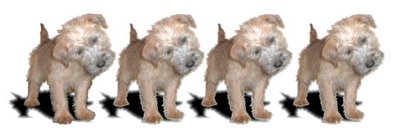Anyone who's watched the Westminster Dog Show has heard something to the effect of "The Portuguese Water Dog is...fill in the blank". This narrative unfolds as the best of that particular breed makes it's way around the show ring with their handler. What's assumed by the show's producer is that the audience understands what's being described is a breed standard as it applies to temperament. Now, if you prefer a more in depth examination, virtually every breed gets it's very own book. Each extols the virtues of the subject breed, both physical and behavioral. These books can be helpful if you're patient enough to find dogs who meet the breed standard but that's no easy task. Often what's described is a narrow band of a breed's actual population at any given time. Unfortunately the shows and the breed books are where a lot of once and future dog owners are gathering the information they'll use to begin looking for their next dog. Many dogs will go home with their new families and grow up as advertised. The rest , however, are a hodge podge brought to you courtesy of the aforemention gene pool. Good breeding is a tricky business, it may well qualify as an art form and raising a well-behaved puppy is hard work. You’d be ill-advised in fact, to consider one if you don’t have the time.
When someone asks me "Are Boxers good with children" my standard wise guy answer is "What Boxer are we talking about?" At one point during the summer of 2005 I found myself with five clients who had golden retrievers. Keeping in mind that this is the second most popular breed in the U.S. the odds were significantly better than say, five clients with Pharaoh Hounds. If I asked the question “Why are Golden’s so popular?” the most likely answer has something to do with a stereo-type that in this case, is enjoyed by the breed. “They’re good family dogs”. Even if we forget for a moment that we’ve neglected to consider whether we’re talking about the Manson family or the Partridge family, just what exactly does that mean? In hindsight I remember these five goldens for the traits that made them individuals, in other words, what made them different from one another. They were, in fact, anything but carbon copies of each
other.
Breed stereo-types have begun to affect some dog owners in their wallets. Several insurance companies have begun to make it very difficult to own certain “dangerous breeds”. Why the quotation marks around “dangerous breeds”? Are the insurance companies just pulling these breeds out of thin air? Of course the answer is no, however, this is a “What came first, the chicken or the egg?” story. Does a Doberman puppy come into the world destined to pose a greater threat to humans than say a Labrador Retriever puppy? Can we examine that question without asking ourselves whether the stereo-types associated with each breed don't have an impact on who’s interested in them to begin with? By extension, might that have an impact on how they're being raised?
It wouldn't be right to cast a jaundice eye on breed stereo-types without shedding some light on better ways to look for your next dog. First, focus on temperment. In the February 26th issue of the Providence Journal, an article on so called "Designer Dogs" by Laura Meade Kirk quotes Jean McGroarty, executive director of the Animal Rescue League in Providence. In it she says, "When it comes to choosing a dog, people should go for temperament instead of looks or lineage." That's good advice. Second, leave the pet stores off your search list. The first question I ask prospective clients is, "Where did you get your dog?". No one who has purchased their dog at a pet store was asked the type of questions responsible breeders ask as a matter of practice. e.g. "What is the longest period of time the puppy will be left alone at home?" Pet stores do not evaluate for temperment and frequently purchase their puppies from dubious sources. Third, consider your local animal shelter. Petfinder.com is a virtual database of dogs waiting for homes in shelters around the country and near you. A growing number of shelters are evaluating the temperment of the dogs in their care. While these tests constitute no guarantee of good temperment they do provide valuable insight. Also, most, if not all breeds are represented by a rescue organizations and most if not all of these rescue organizations evaluate the temperment of the dogs in their care.
At the end of the day there's just no way to be absolutely sure what you're getting when you decide to bring a dog into your home. In the interest of full disclosure many of the dogs I work with that came from pet stores where smart, fun, physically healthy and by all accounts, wonderful additions to their respective families. Sadly, many of the dogs I see and work with at the Warwick Animal Shelter come from pet stores too; these poor souls are often the worst representatives of their breed. Plagued with health and behavioral problems, many don't find homes. While this post is intended to address stereo-types, pet stores play to the perceptions that constitute stereo-types. As a consequence they will alway figure heavily in any discussion of the subject.
Jim O'Neill
Great Dog K9 Training


